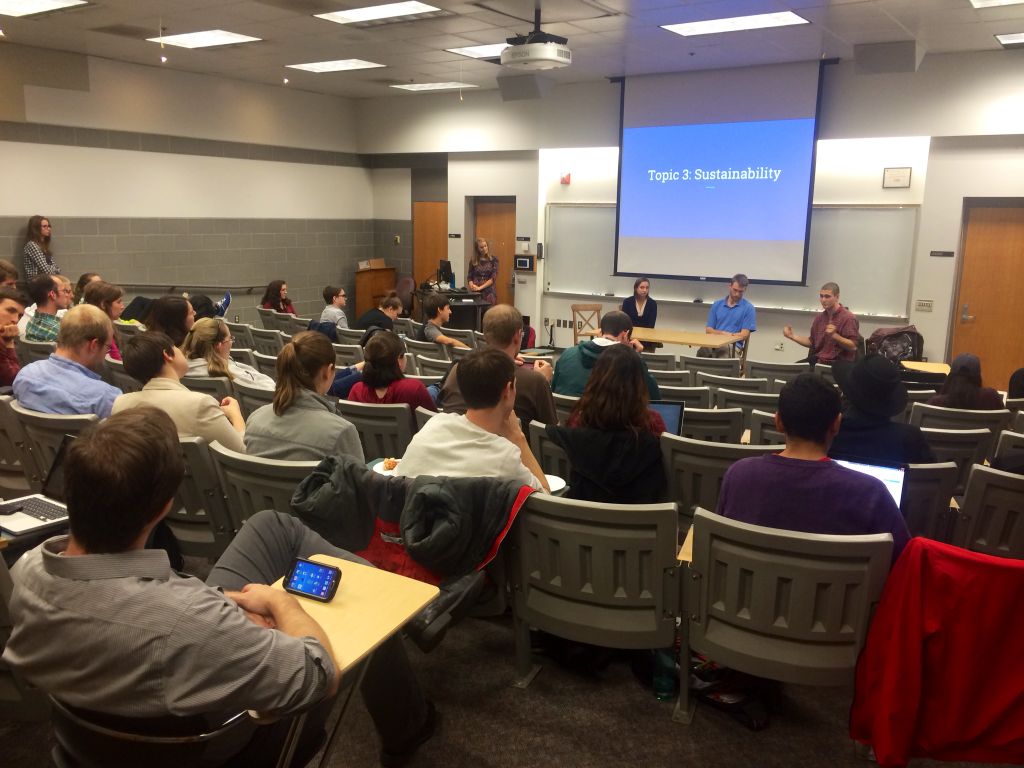
TERP Climate, a campus organization that fosters discussion on climate change, hosted a student-led forum Thursday night to engage the campus community and introduce climate change as a multidisciplinary issue.
Junior Kelsey Malloy, president of the University of Maryland chapter of the American Meteorological Society, joined 40 other students in the Computer and Space Sciences Building as a panel of four tackled questions on climate, particularly how this university can be more sustainable.
“TERP Climate wants to gauge what Maryland thinks are the big issues of climate change and what questions we need to ask or think about,” the atmospheric and oceanic science major said.
Freshman Emelia Gold, one of the panelists, said the climate is changing faster than it ever has in history, largely because of greenhouse gases.
“The climate has risen 1 degree Celsius since the beginning of the Industrial Age, which is faster than species or ecosystems can adapt,” the atmospheric and oceanic science major said. “That’s how we know climate change is anthropogenic, or caused by humans.”
Some people might not be willing to make lifestyle changes to reduce emissions because they believe it restricts their human rights, said Chelsea Stolt, a senior anthropology major.
“Many people in developed countries have the strong opinion that driving a car or eating meat is their human right, but they’re not understanding that those little things are part of the reason people are being displaced from their homes or not having enough to eat,” Stolt said. “They are the people facing the impacts of climate change.”
Junior Alex Ortiz attended a three-day student conference in Paris last week, leading up to this week’s 21st Conference of the Parties, in which the UN will discuss climate change, to discuss similar climate questions with about 5,000 students from all over the world. One main issue is that people don’t know what climate change is, the atmospheric and oceanic major said. A lot of people only think of polar bears when they think about climate change, but there’s more to it than that, he said.
READ MORE: University of Maryland signs White House climate action pledge
The core solution to the problem, the panelists agreed, is reframing the issue to encourage widespread involvement.
Eric Marshall-Main, a senior communication studies major at University of Maryland University College, echoed that sentiment and said the focus on how individuals can reduce personal emissions needs to change.
Instead of turning off the lights and taking shorter showers, people need to consider large sources of energy consumption such as air travel. Choosing to fly once a year instead of three times could make a big difference, Marshall-Main said.
Senior environmental science and policy major Ori Gutin said the U.S. government has tried to move away from the ideology that climate change is only an environmental issue to frame it as a national security or economic issue.
“Everybody isn’t a scientist. Climate change is multidisciplinary at its core, so we need to reframe the issue to make it of interest to everyone,” the panelist and sustainability adviser for the Office of Sustainability said.
This was the first event the undergraduate meteorological society held with nonmembers, Malloy said, but there are plans for more. The society hopes to host a larger forum in the spring with university faculty members and professionals not affiliated with the university to discuss a wider range of topics within the climate change discussion, Malloy said.
“We only have one Earth to call home,” Malloy said. “I don’t want the next generation wondering why we didn’t do anything about climate change when the signs were right in front of us.”



